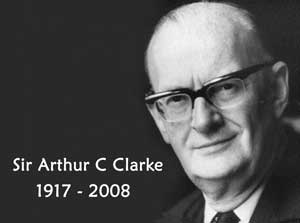Arthur C. Clarke, a science fiction author, has had a very interesting life. Arthur was born on December 16, 1917, in Minehead, England. He was the oldest of four children. His two brothers were Frederick and Michael, and his sister’s name was Mary. As a child, he enjoyed science very much. He lived on a small farm, and enjoyed frequent trips to the nearby ocean. When he was 13 years old, he constructed his own telescope, and changed a bike light to transmit sound along the path of light it gave off. Arthur made his first literary connections by writing in the school newspaper. He attended elementary, Middle, and high school in his home town, and then later went to King’s College in London, where he made honors in Math and in Physics in 1948.
After Arthur had finished college, he became a member of the Royal Air Force.Then later he became the assistant editor of Science Abstracts, a  science magazine. After quitting his job as the assistant editor, he decided to become a full-time science fiction author. Arthur has never been married, and still, to this day, is a bachelor. Clarke is a very successful writer. In fact, he is considered to be one of the most successful science fiction authors ever! He has written many books, including: Hammer of god; 2001, a space Odyssey; Prelude to Space; The Sands of Mars; Islands in the Sky; Against the Fall of Night; Childhood’s End; Expedition to Earth; Going into Space; and Earthlight. Arthur has also written a few Nonfiction books, like Interplanetary Flight, and The Exploration of Space. Also, one day, he had an argument with a colleague, and said, “When a distinguished but elderly scientist states that something is possible, he is almost certainly right. When he states that something is impossible, he is very probably wrong.” (Science Digest ) Arthur has won many prestigious awards, including the UNESCO Kalinga Prize, The Franklin Institute gold medal, the Robert S. Ball award, and the Aviation/Space Writers Association Award.
science magazine. After quitting his job as the assistant editor, he decided to become a full-time science fiction author. Arthur has never been married, and still, to this day, is a bachelor. Clarke is a very successful writer. In fact, he is considered to be one of the most successful science fiction authors ever! He has written many books, including: Hammer of god; 2001, a space Odyssey; Prelude to Space; The Sands of Mars; Islands in the Sky; Against the Fall of Night; Childhood’s End; Expedition to Earth; Going into Space; and Earthlight. Arthur has also written a few Nonfiction books, like Interplanetary Flight, and The Exploration of Space. Also, one day, he had an argument with a colleague, and said, “When a distinguished but elderly scientist states that something is possible, he is almost certainly right. When he states that something is impossible, he is very probably wrong.” (Science Digest ) Arthur has won many prestigious awards, including the UNESCO Kalinga Prize, The Franklin Institute gold medal, the Robert S. Ball award, and the Aviation/Space Writers Association Award.
An interesting fact is that Clarke proposed a belt of communication satellites, and now they exist. He also helped make the idea of space travel popular in the sixties. For some army history, Arthur joined the RAF in 1941. He specialized in radar, and was put in charge of the Ground Controlled Approach unit when it was still in its experimental stages. I think he said it best – “I don’t pretend that we have the answers, but the questions are certainly worth thinking about.” ( OMNI) Arthur now resides in Sri Lanka, and has not left the country for many years. He has recently finished making a computer with a fellow science fiction author, and has finished his sequel to his book “2001- A Space Odyssey”. The sequel is “3001 – A Space Odyssey”.
